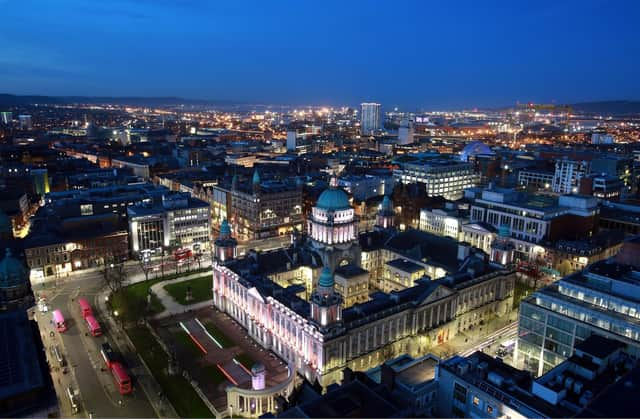DUP's Kingston calls for clarity from the Equality Commission on whether Irish street signs are 'neutral'


The DUP has now asked for clarity from NI’s equality watchdog over whether Irish language signs are ‘neutral’ amid controversy over a council policy which has seen applications rocket across the city.
Yesterday, the News Letter revealed that the Equality Commission had cast doubt on a Belfast City Council claim that erecting Irish language street signs is accepted as a “neutral act” by the body – and is therefore non-discriminatory.
Advertisement
Hide AdAdvertisement
Hide AdApplications for Gaelic translations on signs have soared since the council drastically lowered the support threshold to just 15%. In the past, two-thirds of residents would need to have supported the change, which was then reduced to a simple majority before the latest change.
This has resulted in applications for Irish language signs in unionist areas across the capital.
The DUP’s local government spokesperson Brian Kingston told the News Letter: “We have consistently argued across Council chambers that the political ambition to foist bilingual signage onto every community is neither good for community relations or a wise use of public funds”.
A freedom of information request by the TUV revealed that of the 600-plus requests for 464 bilingual signs, over 97% are for Irish. The rest are mainly Ulster Scots. The party says "unwanted" requests for Irish signage have been made in areas such as Ebor Street in the Village, Ballysillan Road, and the Upper Newtownards Road.
Advertisement
Hide AdAdvertisement
Hide AdThe Equality Commission told the News Letter that it “has not provided specific advice to Belfast City Council re their policy on the erection of Irish language signage” – in direct contradiction of Belfast City Council’s claim in an equality document that it had.
The policy – which was passed by a political vote in the council – was ‘called-in’ twice by the DUP. Councillors in Northern Ireland can ask for a council decision to be reviewed on the grounds that it could adversely affect residents or wasn’t properly considered.
On those call-ins, Kingston says: “On both occasions legal opinion was brandished to defend the policy. We have never agreed with the policy which seems absurd. There needs to be proper scrutiny of this issue and a clear statement from the Equality Commission about their position. The Commission’s position matters because words from their own website in relation to the European Charter for Regional or Minority Languages were used by the Council in relation to the claim that erection of signs is a ‘neutral act’ and therefore is not discriminatory.
“If their position was misconstrued, it isn’t good enough to wring their hands when they appear to have turned a blind eye to it at the time. Their apparent stance as outlined in the Council’s EQIA was part of the backdrop to the political decision to impose this signage policy.”
Advertisement
Hide AdAdvertisement
Hide AdPublic bodies carry out equality impact assessments on new policies to ensure they are compliant with equality law. The News Letter asked both Belfast City Council and the Equality Commission whether the dual signage equality assessment, as well as the council’s policy, are valid given the dispute between the organisations about the commission’s ‘advice’ in the document.
Neither organisation answered the question. The commission said “it is for Belfast City Council to assure itself that it has complied with its Equality Scheme commitments”. The council said the assessment “references the position of the Equality Commission, as set out in May 2015 in response to DCAL’s public consultation on Proposals for an Irish Language Bill. We are liaising with our colleagues at the Commission in relation to feedback raised in media reports today.”